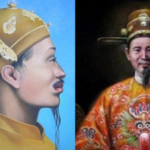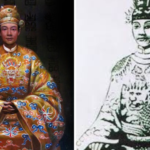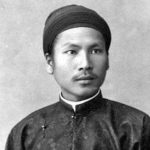Nguyen Hoang, a national founding father, laid the groundwork for the Nguyen Phuc dynasty and the Nguyen family reign. Successive heirs continued his legacy for two centuries, but the country was still like a house under construction, incomplete. Therefore, the heavens took notice of a virtuous and talented person, who gave birth to Hoang Khao – the Supreme Ancestor, a virtuous and wise emperor.
Since childhood, Hoang Khao witnessed the chaotic state of the nation. With superior intelligence and heroic spirit, Hoang Khao decided to rebel and rescue the situation. With a pledge to defeat the enemy with three arrows, he led the army with determination to end the disorder. Despite having few soldiers, he fought, sometimes winning, sometimes losing, sometimes gaining a part of the territory and sometimes almost losing it immediately.

After sending his son to be a hostage in Phu Lang Sa, he sought refuge in Vong Cac (Bangkok), like a black panther in the forest or a dragon god in the deep abyss. He later returned to his homeland. He distributed equal benevolence to the soldiers and endured hardships in folklore and legends. Despite having to eat rough corn in difficulties, he never wavered.
Thanks to his foresight and compassion, he made the road smooth and his strength was unstoppable. He led the country out of darkness and expanded the territory from Lang Son to Ha Tien.

For 29 years, from 1774 to 1802, he fought relentlessly, expanded the nation, and built a state with complete rituals, music, courts, and administration. He also showed his filial piety by inviting his mother to the Truong Tho Palace and educating his children within the Khon Nguyen palace.
Hoang Khao sent envoys to other countries to maintain friendly relations and respect old lineages such as the Le family and the Trinh lords. His accomplishments and virtue shine like the sun and moon, impossible to conceal.
Examining the Long-Term Impact of the 7th May 1954 Dien Bien Phu Victory
As we mark the 66th anniversary of the victorious battle at Dien Bien Phu on May 7, 1954, it is important to reflect on the monumental impact this event had on the world. Let us take a closer look into the historic significance of this momentous occasion in the Vietnamese people’s struggle for independence.



































